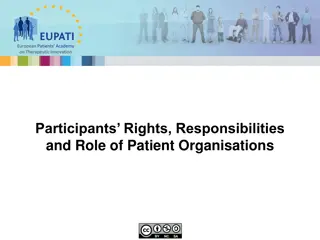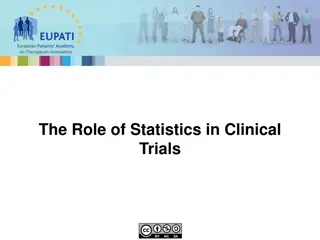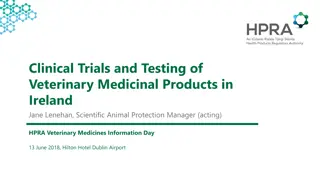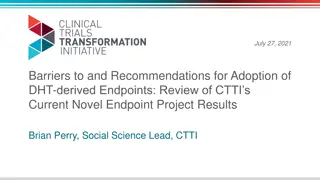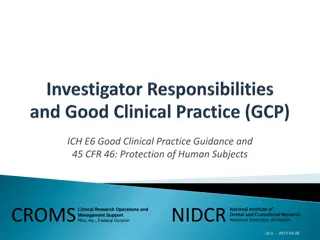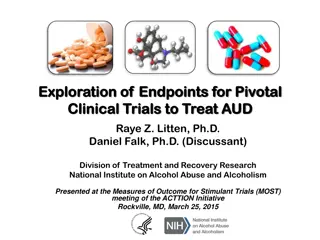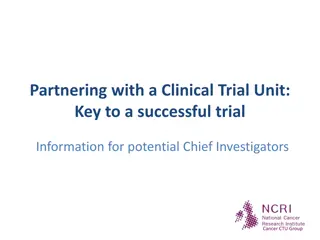Understanding Ethics in Clinical Trials: A Comprehensive Overview
Explore the historical context, important ethical guidelines, and the ethical framework with 7 principles in the field of clinical trials. Learn about key trials, ethical considerations, and guidelines governing human subject research in clinical medicine. Delve into the critical aspects such as informed consent, equipoise, and risk-benefit evaluations that shape ethical conduct in clinical research.
Download Presentation

Please find below an Image/Link to download the presentation.
The content on the website is provided AS IS for your information and personal use only. It may not be sold, licensed, or shared on other websites without obtaining consent from the author. Download presentation by click this link. If you encounter any issues during the download, it is possible that the publisher has removed the file from their server.
E N D
Presentation Transcript
PERFUSE Clinical Trial Course Ethics of Clinical Trials I Clara Fitzgerald, MPH
Agenda Ethics of Clinical Trials Part 1 Historical Context Rules of Science Important Ethical Guidelines Responsible Conduct of Research & the 7 Principles Ethics of Clinical Trials Part 2 Informed consent Equipoise
Ethics in Clinical Research Human subject research systematic investigation that involves the use of human subjects in any capacity Distinction between clinical research and clinical medicine Clinical Research Clinical Medicine Generate useful & generalizable knowledge Benefit the patient being cared for Goal Double blind RCT, dose escalation trials Standard of care, evidence based Method Risk involved may not be well understood and benefits may not be direct Risk involved are understood and patient stands to benefit directly Risks
Historical Perspective Nuremberg Trials (1945 -1947) During WWII Nazi German physicians conducted inhuman and unethical trials and experiments among prisoners in concentration camps Tuskegee Study of Untreated Syphilis Trial (1932-1972) African American men living in Macon County Alabama with latent syphilis were enrolled Trial aim was to study the disease course of Syphilis Penicillin recognized as a recommended treatment for syphilis in 1947, the participants did not receive medical treatment
Important Ethical Guidelines 1. The Nuremberg Code (1949) 2. The Declaration of Helsinki (1964) 3. The National Research Act, the Common Rule (1974) 4. The Belmont Report (1979) 5. International Conference on Harmonisation (ICH) Guidelines for Good Clinical Practice (1996)
Ethical Framework: 7 Principles Valuable Scientific question Valid scientific methodology Fair subject selection Favorable risk-benefit evaluation Independent review Informed Consent Respect for enrolled subjects
1.Valuable Scientific Question Is the question valuable? Has the question already been answered? Is this research worth doing?
2. Valid Scientific Methodology Ethical clinical research should be designed to yield results that are: Valid Reliable Interpretable Feasible Generalizable
3. Fair Subject Selection Scientific objectives should be fair- Inclusion / Exclusion criteria Recruitment Strategies Patient selection
4. Favorable Risk-Benefit Ratio Understand Risk Define and communicate risk Minimize Risk Only including procedures or tests that are absolutely necessary Define Benefits Direct and secondary benefits Maximize Benefits
5. Independent Review Institutional Review Boards- Ensure ethical requirements have been fulfilled Risk are justified by the anticipated benefits, if any, to the subject or by the information to be gained from the study Informed consent is adequate Risks are minimized
6. Informed Consent The voluntary consent of the human subject is absolutely essential The Nuremberg Code Informed Consent Disclosure of information Understanding of risk / benefit Voluntary Authorization
7. Respect for the enrolled subjects Ethical requirements do not end at informed consent Ongoing throughout the study- Monitoring welfare / Interim analysis Ensuring patient confidentiality Updating patients with new information The right to withdrawal Post study planning
Ethical Framework: 7 Principles Valuable Scientific question Valid scientific methodology Fair subject selection Favorable risk-benefit evaluation Independent review Informed Consent Respect for enrolled subjects
References and Further Reading https://www.wikidoc.org/index.php/Textbook_of_clinical_trials Emanuel E, Wendler D, Grady C. What makes clinical research ethical? JAMA 200, 283(20): 2701-11 The Nuremberg Code. Trials of war criminals before the Nuremberg military tribunals under control council law. 1949. [14/10/13]. http://nuremberg.law.harvard.edu/php/docs_swi.php?%20DI=1&text=medical. World Medical Association. Declaration of Helsinki, 6th revision. 2008. [14/10/13]. http://www.wma.net/en/30publications/10policies/b3/ The Belmont Report. Ethical principles and guidelines for the protection of human subjects of research.Department of Health, Education, and Welfare., National Commission for the Protection of Human Subjects of Biomedical and Behavioral Research.J Am Coll Dent. 2014 Summer; 81(3):4-13. Jones JH. Bad Blood: The Tuskegee Syphilis Experiment, expanded edn. New York: The Free Press; 1993 [1981] The Nuremberg Code. Trials of war criminals before the Nuremberg military tribunals under control council law. 1949. [14/10/13]. http://nuremberg.law.harvard.edu/php/docs_swi.php?%20DI=1&text=medical. Howick JH. The Philosophy of Evidence-Based Medicine. London: Wiley-Blackwell; 2011.






